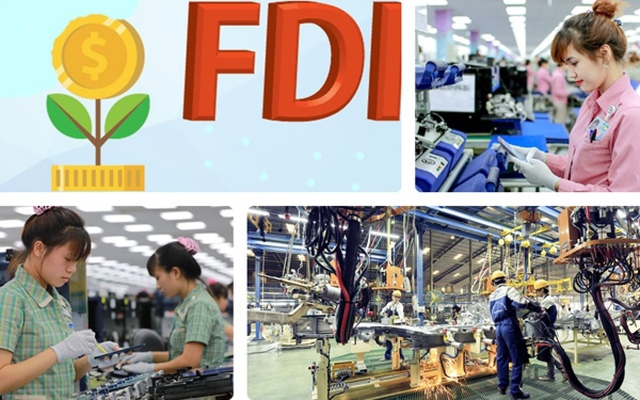Clear evidence of attractive investment destination
VGP - Viet Nam has many favorable conditions to maintain foreign investment inflows, or even attract many large-scale projects in the near future.

A sharp increase of FDI into Viet Nam
Uniqlo-a global fashion retail brand from Japan, has officially announced plans to expand its retail store system in major cities of Hai Phong and Ho Chi Minh City, with two new stores at Vincom. Plaza Imperia (Hai Phong) and Parc Mall (HCM City). These are Uniqlo's 25th and 26th stores, after nearly five years of operation in Viet Nam.
"The opening of retail stores in strategic cities is an important part of our long-term plan in Viet Nam," said Mr. Nishida Hideki, General Director of Uniqlo Viet Nam.
Uniqlo is not the only foreign investor wishing to expand investment and business activities in the Southeast Asian nation.
Recently, at an investment promotion conference held by Hai Phong City in Shenzhen (China) on August 7, the city's authorities granted investment registration certificates to seven projects worth US$190 million.
Foreign direct investment inflows to Viet Nam reached US$18 billion in the first seven months of 2024, representing a year-on-year increase of 10.9 percent, according to the Ministry of Planning and Investment's Foreign Trade Agency.
In the January-July period, the amount of disbursed investment valued US$12.55 billion, up 8.4 percent against the same period last year.
Foreign investors injected US$10.76 billion in 1,816 new projects, up 35.6 percent and 11.6 percent, respectively.
Meanwhile, 734 projects had their capital increased with a total amount of more than US$10.76 billion, down 0.3 percent in the project number, and up 19.4 percent in capital year-on-year.
These are significant investments, indicating that Viet Nam remains an attractive destination as evidenced by the increased amount of new capital and quality of investments, noted Minister of Planning and Investment Nguyen Chi Dung.
Viet Nam willing to absorb huge investment capital
In its report Viet Nam at a glance, HSBC noted that Viet Nam has sustainably enjoyed FDI inflows well above 4 percent of its GDP, among the highest in ASEAN (as a share of GDP).
Regarding fundamentals that help Viet Nam attract FDI, the bank said, in the past 20 years, Viet Nam has grown to become a major manufacturing base that is tightly integrated with the global supply chain. Exports have grown more than 13 percent annually on average since 2007, dominated by foreign-invested enterprises.
Comparing labor costs across Asia, manufacturing wages in Viet Nam are lower than that in mainland China and other peers.
Other costs, such as of the energy needed to operate factories, are also competitive in Viet Nam. When comparing electricity prices for businesses, Viet Nam ranked second-lowest among its peers.
In addition, Viet Nam has made significant progress in setting up various economic agreements with major trading partners, such as the EU-Viet Nam FTA (EUVFTA) and the Comprehensive and Progressive Agreement for Trans-Pacific Partnership (CPTPP). In turn, these developments have facilitated and enabled foreign investment, with Viet Nam seen as increasingly open to FDI, per the OECD.
Part of the favorable investment environment can be explained by proactive support from the government via the tax system. Viet Nam has a competitive position relative to its peers with a 20 percent statutory corporate income tax rate.
So far, these pull factors have been important in attracting investment and integrating Viet Nam with the global value chain, HSBC highlighted in its report.
In fact, tech giants have continuously invested in Viet Nam, remarkably Amkor, Foxconn, Quanta, Goertek, and LG.
Earlier this year, Foxconn Group decided to pour more than US$383 million in a project in Bac Ninh province and recently, continued to invest US$550 million in Quang Ninh province.
Meanwhile, Hyosung Group, with over US$5 billion in Viet Nam, is planning an additional US$300 million in a data center in Ho Chi Minh City. The group wishes to turn the southern province of Ba Ria-Vung Tau into a biotechnology and material production center in the country and the region.
Indian transport and utility infrastructure developer Adani plans to pour US$10 billion into Vietnamese projects, its chairman Gautam Adani said on July 31 in a meeting with Prime Minister Pham Minh Chinh.
These projects include a US$2-billion investment in the Lien Chieu port in Da Nang. The company is interested in working on other aviation and logistics cooperation projects, including the construction of Chu Lai Airport in Quang Nam Province and Long Thanh International Airport in Dong Nai Province.
At a meeting with the FDI enterprises and the annual Viet Nam Business Forum in Ha Noi on March 19, PM Pham Minh Chinh reiterated that Viet Nam commits to guaranteeing the legitimate rights and interests of businesses in general and FDI enterprises in particular, ensuring energy stability towards green transformation, and developing green transformation ecosystem, digital economy, and digital transformation.
The Vietnamese Government commits to creating favorable conditions for domestic and foreign investors with the spirit of "harmonious interests, shared risks", he underlined./.

